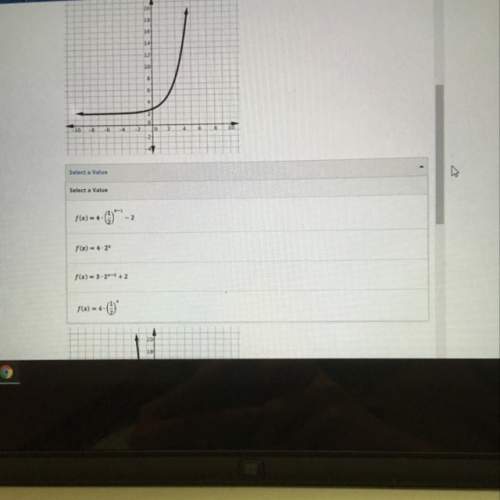
Mathematics, 25.01.2020 17:31, emmaja121003
The number of bacteria in a culture is growing at a rate of 1500e^(3t/4) per unit of time t. at t=0, the number of bacteria present was 2000. find the number present at t=4.

Answers: 2
Other questions on the subject: Mathematics

Mathematics, 21.06.2019 19:30, dolltan
The table below represents the displacement of a fish from its reef as a function of time: time (hours) x displacement from reef (feet) y 0 4 1 64 2 124 3 184 4 244 part a: what is the y-intercept of the function, and what does this tell you about the fish? (4 points) part b: calculate the average rate of change of the function represented by the table between x = 1 to x = 3 hours, and tell what the average rate represents. (4 points) part c: what would be the domain of the function if the fish continued to swim at this rate until it traveled 724 feet from the reef? (2 points)
Answers: 2

Mathematics, 21.06.2019 23:10, nekathadon
Frank is lending $1,000 to sarah for two years. frank and sarah agree that frank should earn a real return of 4 percent per year. instructions: a. the cpi (times 100) is 100 at the time that frank makes the loan. it is expected to be 113 in one year and 127.7 in two years. what nominal rate of interest should frank charge sarah?
Answers: 3

Mathematics, 22.06.2019 02:40, liyahheadhigh
Benefit(s) from large economies of scale, in which the costs of goods decrease as output increases. natural monopolles perfect competition
Answers: 1

Mathematics, 22.06.2019 04:00, saeedalr366
According to the national center for health statistics, in 1990, 28 % of babies in the united states were born to parents who were not married. throughout the 1990s, this increased by approximately 0.6 % per year. if this trend continues, in which year will 52 % of babies be born out of wedlock? in__52 % of babies will be born out of wedlock
Answers: 1
Do you know the correct answer?
The number of bacteria in a culture is growing at a rate of 1500e^(3t/4) per unit of time t. at t=0,...
Questions in other subjects:



English, 18.03.2021 03:00


History, 18.03.2021 03:00

Mathematics, 18.03.2021 03:00


Mathematics, 18.03.2021 03:00

Social Studies, 18.03.2021 03:00

Mathematics, 18.03.2021 03:00







